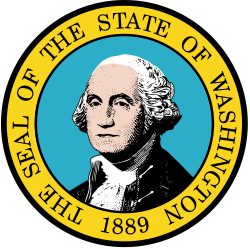November 4, 1980 | |||||||||||||||||
| |||||||||||||||||
 County results Gorton: 50–60% 60–70% Magnuson: 50–60% | |||||||||||||||||
| |||||||||||||||||
| Elections in Washington (state) |
|---|
 |
The 1980 United States Senate election in Washington was held on November 4, 1980. Longtime incumbent Democratic U.S. Senator Warren Magnuson, the Senate President pro tempore, ran for a seventh term in office but lost re-election to Republican State Attorney General Slade Gorton. Magnuson was the most senior U.S. senator [1] to lose re-election until Ted Stevens' defeat in 2008. Gorton was one of the dozen Republicans who beat Democrats to seize control of the Senate fueled by Ronald Reagan's landslide victory. This was the only time since 1926 that Republicans won Washington's Class 3 Senate seat and after losing re-election to this seat in 1986, Gorton later won Washington's other Senate seat in 1988 and 1994 before losing re-election again in 2000. This was the first time since 1926 that Republicans won the Class 3 Senate seat in Washington.

